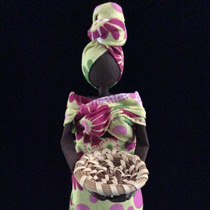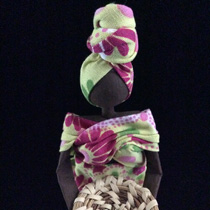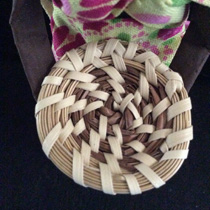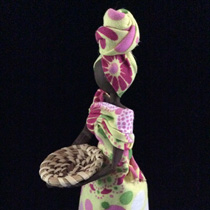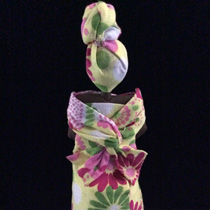Description of Figure/Doll
This “Coastal Girl” is 100 percent handmade doll. She is constructed from cloth on top of a plastic cup. She is holding a sweetgrass basket woven together from the natural grass found along the Carolina coast. Her card says “My name is Akachi, a West African. My name means “Hands of God.” The basket in my hand was brought to the area by slaves who came from West Africa. The Basket Name id Fanner.”
Link to higher resolution images at ClipPix
USA: South Carolina
Location: Southeastern USA
Capital: Columbia
Main language: English
Currency: US Dollar
Figure/Doll
Construction: sweetgrass, plastic cup, cloth
Height in Centimeters: 14
Height in Inches: 6
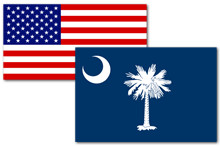
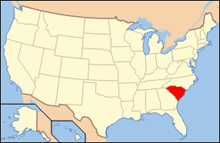
South Carolina Gullah Geechee: Making Sweetgrass Baskets on a Coastal Island
Reading Level: 6.30
My name is Akachi and I live on an island near Charlestown, South Carolina. I am 12 years old. My grandma makes baskets with sweetgrass and sells them to tourists. When I am not in school, I like to help her. As we carefully weave the grass and reeds into baskets, she tells me stories of her childhood.
Gramma told me that our Gullah Geechee ancestors came to South Carolina as slaves over 100 years ago. The plantation owners in America needed help, so they bought slaves. The slaves were captured in parts of Africa where people knew how to grow rice and cotton.
Another skill the slaves brought to America was basket weaving. To make the baskets they gathered grasses and left them in the sun to dry. Then, they wove the reeds and into trays and baskets. In Africa, the baskets were used in the fields to separate the rice from the chaff. After the Civil War, the slaves in South Carolina were freed. Some stayed to work on the plantations. Some opened a business. My ancestors and other Gullahs found that the baskets could also be sold to tourists. They made many, many different decorative designs. No two baskets were identical.
Gramma says she learned to weave baskets when she was 7 years old. She and her mother worked on baskets every day except Sundays. They made baskets and sold them at a roadside stand to tourists and others.
In 2005, the U.S. Congress passed the Gullah/Geechee Cultural Heritage Act. This Act helps to preserve Gullah/Geechee folklore, arts, crafts, and music. As a result, the Gullah/Geechee culture from Africa has been re-born.

